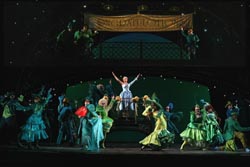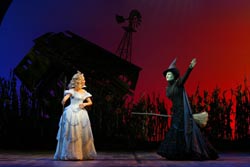Sound For The Stage

A daily selection of features, industry news, and analysis for AV/IT professionals. Sign up below.
You are now subscribed
Your newsletter sign-up was successful
- Wicked is currently being produced in six locations around the world, including Broadway.Despite predictions of Broadway's imminent collapse, a well-staged show that has a good storyline and catchy numbers will nearly always capture the audiences' imagination, as has proved to be the case with Wicked. Despite failing to secure initial critical acclaim, the show has had audiences standing on their feet in every corner of the globe, including Broadway.
- The sound designer behind Wicked is Tony Meola, well respected for his "natural" approach. Tony's career on Broadway spans more than 20 years across dozens of show credits, including Lion King, Kiss me Kate, and Smokey Joe's Caf. For Wicked, Tony brought together a tried and tested set of equipment to give him a predictable and controllable result, enabling him to focus on the fundamental job of helping to tell the story. For him, "Wicked is an absolute joy of a show and I have loved working on it from Day 1."
- Tony's approach involves focusing on telling the story, explaining, "The sound mustn't get in the way of the lyrics, it must support them. There is a tendency to think that if you turn up the volume, it will keep sounding better. I prefer to think about achieving bigger and better quality."
- Over the years, he has worked with a lot of different equipment and relies on certain tools to enable him to focus on the creative challenge. The sound system includes a 101-slot Cadac J-Type Live Production Console, with the specification including 35 programmable stereo and mono dual-input modules and 67 motor faders. Alongside this are 36 Sennheiser SK-5012 radio microphones, and a comprehensive selection of Meyer Sound loudspeakers, with the M-1D line array system at the core.
Wicked Broadway's associate sound designer Kai Harada.
Cadac and Meyer are two manufacturers that Tony trusts and has worked with over many years, "The J-Type is so versatile, you can set it up just as you want it, like configuring it for lots of outputs and fewer inputs. I loved the input structure when the desk first came out back in 1992, and since then there have been some significant evolutions." The most notable of these was the introduction of motorized faders, which really opened up some spectacular options, as well as the programmable modules.
Tony's team on the various productions of Wicked includes associate sound designer Kai Harada, with a ten-year track record on Broadway and around the world to his credit. Kai's take on technology developments, especially the digital versus analog console debate, highlights some of the key issues behind the choice of equipment for a Broadway production. "Familiarity is a very important factor with any equipment for a big show, as you know what to expect when you turn a knob and can concentrate on the things that really matter."
Kai has used plenty of digital consoles on smaller productions, but is not yet sold on using one as the main desk for a Broadway show. With a split second to change something on the fly, his comment is that he needs to be able to lunge at the right knob and know it will be the right one. There just isn't time to go down through a few layers. On Wicked, the team is using digital desks as sub mixers, finding that a complementary combination of analogue with digital is a good solution. Kai thinks Cadac is going the right way with its new S-Digital, "They have focused on it looking and behaving like a J-Type, with its familiar, intuitive user interface, but with the advantages of digital."

Despite predictions that Broadway shows are a dying for of entertainment, box office records continue to get broken. While Wicked received little critical acclaim upon opening, the show has become quite popular. A production like Wicked illustrates the key position that sound is now accorded within a show's creative structure, as well as how the sound component has evolved in the industry. Tony Meola has been closely involved in bringing on the next generation of sound design talent, and is amazed at how the role of sound engineer and designer has evolved in recent years. Shows such as Wicked are a great training ground, with Tony citing the example of Adam Rigby, "He was my intern on the first production of Wicked, moving on to become assistant sound operator, then he mixed the off-Broadway show, 'SHOUT!' and is now assisting me on the sound design for The Ritz." With today's majors and graduate programs in sound, he feels that it has become a proper, grown-up profession and a valued part of theatre.
Despite predictions that demand will collapse, Broadway box office records keep getting broken and every venue going is in demand. A show such as Wicked demonstrates that spectacle and substance do still go together. With six productions around the world, as well as the US tour, Wicked demonstrates that the musical is alive and well. For more information, see www.cadac-sound.com.
A daily selection of the top stories for AV integrators, resellers and consultants. Sign up below.
The AVNetwork staff are storytellers focused on the professional audiovisual and technology industry. Their mission is to keep readers up-to-date on the latest AV/IT industry and product news, emerging trends, and inspiring installations.
